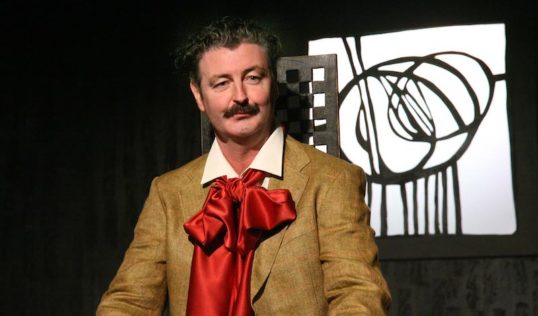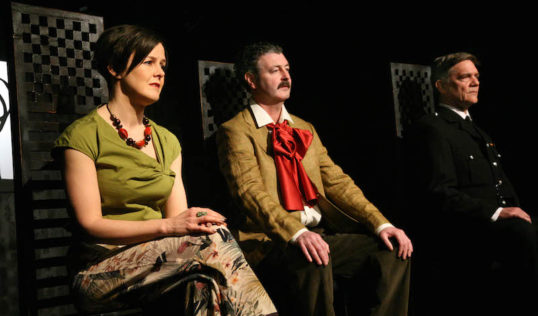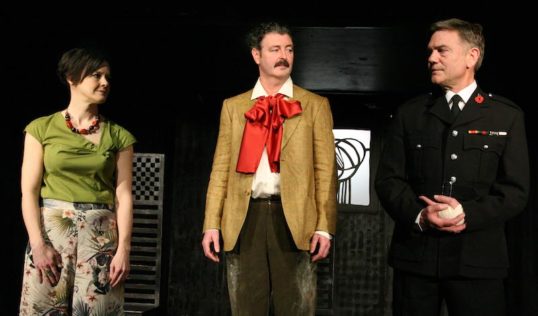PPP: The Mack
★★★★☆ Quietly raging
Traverse: Tue 23 – Sat 27 April 2019
Review by Thom Dibdin
A dark undercurrent of fear runs through Rob Drummond’s fascinating account of the burning of The Mack, the affectionate nickname for architect Charles Rennie Mackintosh’s Glasgow School of Art building.
It is not the burning itself, however, that Drummond conjures up so vividly in director Jack Nurse’s somewhat static, but precisely paced production for A Play, A Pie and A Pint’s lunchtime theatre slot at the Traverse.
The actualities of the two fires which consumed the Mack in 2014 and 2018 are tangential; Drummond’s main concern is the effect of the building’s loss, the impact on those who knew it.
It was only a building and no one died in its destruction – either time. Yet there is a deep wounding which pervades still and Drummond seems to be both allowing the consequent pain to be acknowledged and trying to understand why it exists.
It is told through the first hand accounts of witnesses to the first and second fires – accounts presented four years apart, and tempered with extracts from the 23 letters which Mackintosh wrote to his beloved wife Margaret from France in 1927, when she had to return to London after falling ill.
John Michie is a fire chief, interviewed as a representative of the Glasgow fire service just as they are about to be awarded an Unsung Hero award for the efforts of the 120 fire people who entered the still burning Mack and severely limited the effect of the first fire in 2014.
destroyed completely
Janet Coulson is an American Mackintosh expert, a previous student at the Mack who was one of those helping restore it after the first fire, being interviewed after the second fire in 2018 which destroyed it completely.
Seated between them, on those famous high-backed Mackintosh chairs, James McAnerney creates a studied and somehow despairing image of Mackintosh himself. His letters are full of talk of a raven which visited him as he painted, the depression which afflicted him and the longing that he could return to architecture.
Cutting hard between the three testimonies – each delivered separately but at times interjecting just single word between each other – Drummond draws a complex picture of Mackintosh, using the expert’s testimony to illuminate the context of his letters as she talks about his declining years.
The two modern testimonies are completely fictional – and to be honest Drummond’s writing is a shade florid in places and touched with hyperbole that doesn’t always work – but they are both delivered with such style and understanding that they might as well be real people.
Coulson provides a glimpse of what Mackintosh meant as an architect, the sweep of his lines and his subversion of norms. Her expert is a shade in love with the man who died over half a century before she was born, but it is Coulson’s illumination of the contradictions in mourning the loss of a place that is really clever.
complex and fascinating
Michie has an easy manner as the senior fire officer, tough and traditionally masculine in his approach, while conveying an understanding of the social importance of the building. It soon becomes apparent that there is a real pain behind his stony face, however, and as he twists around trying to get comfortable on the straight-backed chair, Michie provides a particularly complex and fascinating account of how accumulated pain has to be confronted.
This is not always an easy watch, but it is a thoroughly satisfying one. And there is an honesty in its attempt to address how a collective loss can be confronted when the usual outlets of grief are not appropriate.
Running time: One hour (no interval)
Traverse Theatre, 10 Cambridge Street, EH1 2ED
Tuesday 23 – Saturday 27 April 2019
Daily at 1pm; Also Fri eve at 7pm.
Tickets and details: Book here.
ENDS
























Comments (1)
Trackback URL | Comments RSS Feed
Sites That Link to this Post